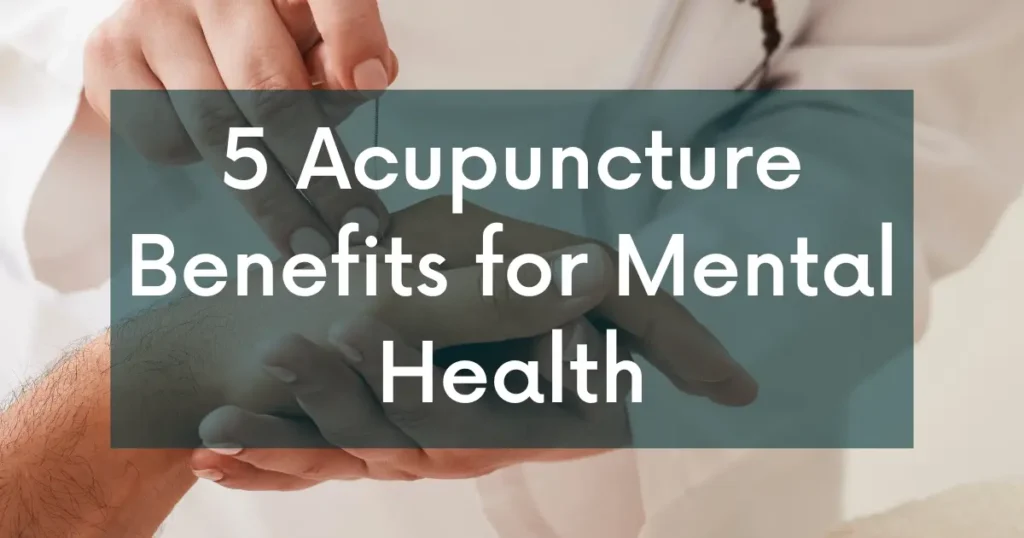Depression
Does ADHD Cause Depression? Find Out Now Here
Does ADHD cause depression? This statistic would suggest that – roughly 30% of those who have been diagnosed with ADHD will likely also have depression or a depressive episode at some point in their lives. There is plenty of research that points to a strong connection between these two disorders. And while they both can…
Read More5 Acupuncture Benefits for Mental Health
Acupuncture Benefits for Mental Health at Amend Treatment Acupuncture is an ancient Chinese medical practice that involves inserting thin needles into specific points on the body. A study from 2024 shows adding acupuncture to a mental health treatment plan improved several factors of patient health “including an 75.5% reduction in pain severity, a 53.1%…
Read MoreWhy is Women’s Mental Health Important?
Given that March is National Women’s History Month, the question ‘Why is Women’s Mental Health Important?’ is pertinent to current mental health and wellness discourse. Mental health is a critical aspect of overall well-being, and women’s mental health, particularly, is a topic that deserves attention. Women face unique challenges and pressures that can impact their…
Read MoreHow Are You Coping with Seasonal Affective Disorder?
Some people thrive in winter. But many others do not due to a form of depression clinically know as Seasonal Affective Disorder (SAD), often misrepresented as the “winter blues.” Seasonal affective disorder is a serious and unfortunately common mood disorder characterized by intense, short-term depression that peaks in the winter months, and subsides as the…
Read MoreHow to Love Someone With Depression
Over 21 million adults in the United States had at least one episode of major depression in the past year. For millions of people, these episodes are a monthly, weekly, or sometimes even daily occurrence. In fact, many of us may know someone with depression, regardless of whether they are open about their struggles. Yet…
Read MoreOvercoming New Year Depression and Sadness
Are you feeling down and depressed after the new year? You’re not alone. Many people struggle with New Year depression and sadness. Typically a new year means new opportunities and new chances for success, right? Well, not always. The new year can be surprisingly depressive, especially if you have the habit of placing unrealistic expectations…
Read MoreDealing with Post Holiday Blues and Depression
Is it normal to feel depressed or experience post holiday blues? According to recent surveys, you wouldn’t be alone if you did. Holiday stress and holiday depression are increasingly common topics of discussion, and statistics show that up to 88 percent of people feel more stressed out than usual over the winter break. But some…
Read MorePracticing Postpartum Depression Self-Care
Postpartum depression is a serious mental health crisis, affecting between 6 and 15 percent of new mothers and disproportionately affecting people with pre-existing mood or anxiety disorders (with about seven times as much risk). Postpartum depression can range from mild to debilitating, leaving new parents feeling anywhere from joyless and exhausted to self-deprecating and even suicidal. However,…
Read MoreWhat is Double Depression Disorder?
Double depression disorder is a diagnosis of two concurrent mental health issues: major depressive disorder and persistent depressive disorder. The term is exclusive to a diagnosis of these two conditions together; a diagnosis of two different depressive disorders or two unrelated mental health issues with mood symptoms is not always called double depression. Double depression is not…
Read More5 Ways to Combat Seasonal Affective Disorder this Fall
Do you happen to find yourself struggling to keep your spirits up during the holiday season? Do you have a much harder time getting out of bed in the winter? Are the long nights and short days making you feel more tired, less active, and generally far less able to enjoy the colder months? Have…
Read More









